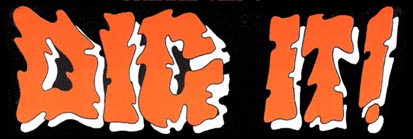
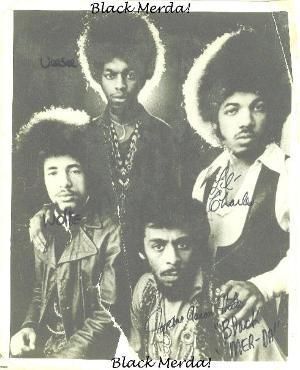
Of course, the first thing to hit you [note : this is addressed to the French speaking public. "Merde" means "shit"] will be their name. I tried that one on the Dig It radio show, to come in and proudly announce I'd found a dynamite funk rock gang called Black Merda ! Ha and double ha, they were double up with laughter. Of course, you've got to pronounce it "Black MUR-dah", but we'll come back to that. All joking aside, those high strung guys from Detroit (yes, once again) look like another one of those underground cult combos of the kind we really dig here.
In the electric atmosphere
of late sixties Motor City, their abrasive sound, their hybridization of
funk with voodoo blues and fuzzed up guitar parts, their eccentric get-ups
and their virulent lyrics struck many minds. Their career was meteoritic
(1968-1972), marked by two albums, comercial failures both, which are now
fetching amazing prices on e-Bay, even after their reissue by the New York
record label Tuff City in 1996. And they owe their come back to a cassette
compilation. In 2001, a collector from Chicago copies a few of Black Rock's
ultra-rare singles for a Memphis pal, who in turn runs countless copies
of that cassette. Under the title "Chains and Black Exhaust", the compilation
soon is found all around the world as a bootleg CD. Their song "Cynthy-Ruth"
is one of the most noticed. This gave Tuff City the impulse to collect
both LPs on one CD. Encouraged by this new enthusiasm for their work, the
Black Merda take to the stage again, with shorter afros and graying hair,
but intact determination. A major event since, as they say in the first
message to appear on their web site, Black Merda was the first Black Rock
band.
Black Rock ? Whazzat ? Living Colour had claimed that label in the mid-80s, to apply it to what we'd call "fusion" hereabouts. But "Black Rock", in the very early 70s, was already a unifying theme for black bands who, in the footsteps of Jimi Hendrix and Sly Stone, were taking back rock'n'roll, which had been appropriated by white people in the early sixties. And adding to it a fair amount of groove and psychedelia in the process. A lot of them remained in complete obscurity, having only released a handful of singles on small labels with local distribution. To know more about all this, it's best to ask the self proclaimed precursors, namely VC Lamont Veasey in person, founder member, bass guitarist and lead singer of Black Merda. Here's a brief review of the history of the phenomenon.
« On the racial level it’s called “Black Rock” solely because Black musicians are playing it…nothing else…just a skin color thang. On another level it’s because Black musicians tend to simultaneously funk while they rock!
On a deeper level…music doesn’t have a color…but it does have a style…in the 50’s Alan Freed called “Black Music” Rock N Roll…but as a result of racially segregated radio stations, music programming at the time “Rock N Roll” became associated with white act’s versions of “Rock N Roll” like Elvis Presley, Pat Boone, Jerry Lee Lewis etc, etc, ad infinitum. Of course Elvis and the others brought their own contributions to “Rock N Roll” and their musical descendants developed it even further, while Black acts and audiences abandoned Rock and went on to develop other forms of music. So now you have the anomalous situation of calling Rock “Black” when Black acts play it and Rock” when White acts play it…when Blacks were the originators of that art form.
Elvis was dubbed “The King of Rock N Roll” because
he’s was well hyped and was white! But the real “Kings” of Rock N Roll
as far who had the greatest influence on early guitarists’ playing styles
was Chuck Berry and for the screaming, kick ass, high pitched vocals and
driving beat, Little Richard, wins hands down! Not to mention that all
heavy metal and hard rock was influenced if not created by the granddaddy
of all such rockers, Jimi Hendrix. He blew the minds of all the big white
British invasion acts, the Beatles, Stones, Led Zeppelin, the Who, you
name it, when he was brought to London by Chas Chandler. Jimi originated
using the big Marshall stacks (other guitarists were still using one amp
at the time) and the hard screaming guitar with controlled feedback. He
took what others saw as noise and made it musical. That’s one of the reasons
his music and sound had such a mind blowing affect on everyone who heard
it…no one had ever heard a guitar played or sound like that before his
Black innovative ass hit the scene! Oddly enough…Jimi transcended racial
classification…no one saw him as Black...well…they saw it…but it didn’t
matter…it was of no consequence!
I’ll get off my soap box now…I hope that gives
you and our readers an inkling of how I and we view the whole “Black Rock”
thang…be that as it may…that name is as about as good as any other.
»
Hendrix, then, is the major reference. By the
way, the first to have put to vinyl a cover version of one of his songs
were the Soul Agents (future Black Merda), who cut "Foxy Lady" as early
as 1967. The first Black Rock band ? What about Sly and the Family Stone,
The Chamber Brothers, the Jimi Hendrix Experience, a fan was asking on
their site. Ruthless answer : those were racially mixed bands. What about
Funkadelic ? Well, they laugh, we were already playing rock when they were
still singing doo-wop as The Parliaments. Sure enough, those guys mean
businessŠ Contemporary witnesses will confirm this. They had an attitude,
a look, and a huge sound. They were young, but experienced already.
Black Merda's roots go back to the early 60s in downtown Detroit. Veasey is about 12 year old. After seeing Elvis on TV, he wanted to become a musician. His bluesman of a father swapped a bottled of whisky for an old guitar and taught him the basics of the instrument. He then met another beginning guitarist, Anthony "Wolf" Hawkins. Both were born in Mississippi and came to Detroit as boys. They practice playing the blues, enlessly reproducing the instrumental numbers that Freddy King releases as B sides to his singles, playing them in 33 then they're too hard to copy. Soon they give up their old acoustic axes for the electric model, and form a first band, The Impacts. One of the singers of that band, Tyrone Hite, will later become their drummer. They play in the city's teenage clubs and attract the attention of various local producers. Still in their teens, their take part in sessions for Nathaniel Mayer and Nolan Strong in the Fortune studios.
" We recorded for Fortune, Golden World and other studios. I remember the building that housed Fortune was old and kind of dark and dingy inside…outside in the front…there was a counter top where piles of old records were on sale that you could dig through…like at a rummage sale…to find something you wanted to buy.
Anthony and I started recording for Fortune when we were around 16 or 17. We had heard of Fortune, Nathaniel Mayer’s “Village Of Love” was a big hit around that time…so was Nolan Strong’s “Mind Over Matter”. So we were quite excited when we got the call to be session musicians for Jack and Vera Brown (I think her name was Vera) the owners. We met Nathaniel and Nolan…I think they were a little older than we were at the time. I think they saw us insignificant because they were the stars and we were just young budding musicians.
We probably played hundreds of hours of
sessions at Fortune…we would begin around 9am...take a lunch break at around
12pm ’til 1pm… and finish up around 4 or 5pm…probably 5 or 6 days a week
for months (I don’t remember how long that went on) I think they paid us
$15 per song…That was great money for some young teen musicians back then
who would have played for free just to be in a recording studio! They paid
us too! We couldn’t believe it! We thought we had died and gone to heaven!
We didn’t always know the names of the songs we were recording and sometimes
arranging and didn’t really care…all we cared about was playing and recording.
»
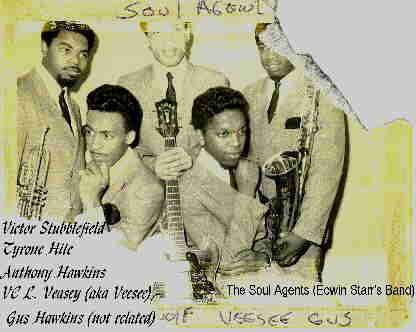
In 1965, they play on the hit "Agent Double-O Soul" d'Edwin Starr (future Motown star, who was recording with Golden World at that time) who decides to take them along on his tour. Veasey switches to bass guitar, and his cohorts Hawkins and Hite, together with sax player Gus Hawkins (no relation to Anthony) and trumpetist Victor Stubblefield, change their name to The Soul Agents at this occasion. VC tells the story:
« It was a lot of fun for some young 20yr
old guys to be out on the road touring with acts who had out hit records
and being paid to do something we loved to do! And we got a lot of girls
too! The racial situation back then sucked because there were only certain
hotels or motels we could stay in and there was always the possibility
of being hassled by racist cops. We played the Apollo theater in New York
a couple of times with Edwin around 1966 or 7…during one of those shows
James Brown set in for a impromptu “Cold Sweat or Papa’s got a brand new
bag” I don’t remember which…been a long time. We did a tour with Edwin
as part of a “Temptations” tour of the New England states and a show at
Madison Square Garden in around 1969. We also toured with Gene Chandler
In 1967. We got word that he was looking for a band to tour with so we
packed up Victor Stubblefield’s (the trumpet player) 1962 white Ford station
wagon, drove to Chicago and played a few tunes for Gene and got hired on
the spot. We toured the West coast from San Diego all the way up to Seattle
with Gene. We did another tour later that year “called the Brunswick Records
Tour” featuring Gene, The Chilites, The Artistics and Billy Butler (Jerry
Butler’s brother), all Brunswick Recording artists. We played dates in
the Southwest, like Vegas, the West coast like L.A. and ended up
on the East coast at the Uptown theater in Philadelphia. A fun time was
had by all! »
It must be said that Gene "Duke Of Earl" Chandler was a notorious wild guy. In an issue of Mojo, Wolf was telling about some epoch making trip that he had engineered around the song "A Day in the Life" by the Beatles. VC remembers this too :
« Yeah…I remember it like it was yesterday. Gene didn’t make us smoke the weed…he offered it to us (me, Tyrone and Anthony) and we accepted it…we were new to getting high at that time so we were always open to offers of free weed! We were in Gene’s dressing room…which didn’t have any windows…and was pitch black when the lights were out…except for a slit of light peering in through the bottom of the door. Gene had a record player in his dressing room with speakers on opposite walls of the room where we stood to listen to the sounds. I think that was the first time we had ever heard “A Day in the Life”…obviously Gene had been tripping off it himself that’s why he set the whole thang up… so he could initiate new unsuspecting victims into taking a similar trip.
There were a few other people from the show who were there as well. We all smoked the weed…Gene put the record on…turned off the lights…dangled a lit cigarette from the ceiling of the room or from his hand…as it slowly spun in the dark he told everyone to look at it. When the big build up came in the song (I’d love to turn urn urn urn urn urn urn urn you on on on on). it was such an unexpected sonic and emotionally intense experience that some people actually ran out of the room! Of course we didn’t…although we may have felt like it! Then Gene would turn the lights on and have a good laugh at how freaked out we all were! So Gene was the first person to actually turn us on psychedelically. I think this was our first “psychedelic experience”.
When we got back to Detroit we would have our own “tripping” parties after our shows… conducted at my house…initiating other unsuspecting Souls into our version of that experience (without the cigarette) and had a big belly laugh at those who couldn’t take it and would run out of the darken room hollering and screaming! »
At the same time, they're discovering Hendrix's
Are You Experienced ? VC had seen a picture of this guy who was playing
a guitar behind his back and thought that this was ridiculous ! They bought
the record just to have a laugh, and it refused to leave their tunrtable
for a whole month. Horns and classical R&B are forgotten, they launch
into a psychedelic phase, without giving up their bluesy roots and the
organic groove which they honed during those countless tours. Their other
regularly-played records are the Beatles' Sergeant Pepper, Muddy Waters'
Electric Mud, or Sly Stones' first few albumsŠ and cartloads of marijuana
to serve as magic potion.
1967 is the year of the Detroit riots too. They had front row seats :
« In between tours the Soul Agents (me, Anthony, Tyrone, Victor Stubblefield and Gus Hawkins, not related to Anthony) would play a little bar up in Lima Ohio called “Wright’s” just to keep busy, make a little dough and pick up chicks. On one of those occasions we were watching the news and suddenly saw all these scenes of Detroit burning, looting and chaos going on all over the place! Anthony and I immediately left for Detroit…we arrived a night…took a cab from downtown Detroit to our respective neighborhoods…along the way we saw fires burning in the distance lit up against the night time sky…it was a surreal experience… Like a dream…like a nightmare!
When we dropped Anthony off at his house…we saw Black and White people sitting on their porches with rifles and handguns to protect their property. I’d never seen anything like that before. I lived a couple of miles away from Anthony and when I got to my neighborhood…I saw a tank with its torrent pointing down my street! There were helicopters flying over head shining spotlights over the ground…it was unbelievable!
But that riot wasn’t really a race riot. Black people didn’t go out in droves attacking White people or vice versa…it was more like a build up of years of frustration over poverty, racism and overt police brutality that finally exploded…there was more looting and property destruction going on than there were Blacks and Whites fighting each other. »
Hardened by those various experiences, VC and
his gang are ready to step up to the next level.
« We actually started doing the Black Merda thang in late 1967 while still performing as the Soul Agents…this was after the tours with Gene Chandler and after we stopped using horns in the band. We were Black Merda in everything but name…the band was me, Anthony Hawkins and Tyrone Hite…in late 1968 we added Anthony’s brother, Charles Hawkins, to the group and changed the band’s name to Black Murder…then to Merda. So when we did the tour with Edwin and the Tempts we were Black Merda. We mostly played black clubs around Detroit…so the audiences were mostly young and black. We did play a local white rock concert room the, Grande Ballroom, a time or two and some places in Toronto, Canada. Norman Whitfield, Don Davis, Popcorn Wily, James Jamerson and various other Motown producers and musicians would hang out at some of our shows. »
A bit arrogant, and thinking that Motown is already over the hill, they kindly turn down Norman Whitfield and Eddie Kendricks, producer and leader (respectively) of the Temptations, who were insisting on working with them. The gang lives as a commune in a shack on the West Side. They almost chose to call themselves "Murder Incorporated". "Gangsta" before their time ! There were Black people being killed by the police in Detroit, and they wanted some dynamic name, Veasey would later say. Humongous afros, flashy clothes, politically relevant lyrics and saturated guitars: they were the sonic version of Black Power, of which Detroit was one of the strong points. We knew where they were coming from and we agreed with some of them, but we had our own ideas, he would in essence comment.
They even were described as the MC5's black alter egos, but VC disagrees :
« No I don’t…first of all…the MC5 were a straight up Rock N Roll band…we weren’t…Our musical approach was a lot more diverse than theirs…I’m not sure what there lyrics were about…never really paid that much attention to them…
But ours were about poverty, racism, hypocrisy, despair, freedom, separating reality from fantasy, consciousness raising and expanding and all of the bad shit that was befalling Black people and others on the everyday street level of experience back then. Our lyrics weren’t so much political as there were truthful and a light shining intensely on issues that people didn’t want to see but needed to see and needed to come to grips with in order to live a better, happier life and to help others do the same.
So yes in some cosmetic, overt way, you could compare Black Merda to the MC5…but that’s were the comparison ends. »
In fact, they had no real contact with the city's
white musicians (« No we didn’t, but in the early days before, Black
Merda, as a young teen group “ The Fabulous Impacs” we shared “record hop”
stages with a young Bob Seger. »). At that time, they play along
the Parliaments (who have begun their transition to funk), the Spinners
or Charles Wright and the Watts 103rd Street Rhythm Band.
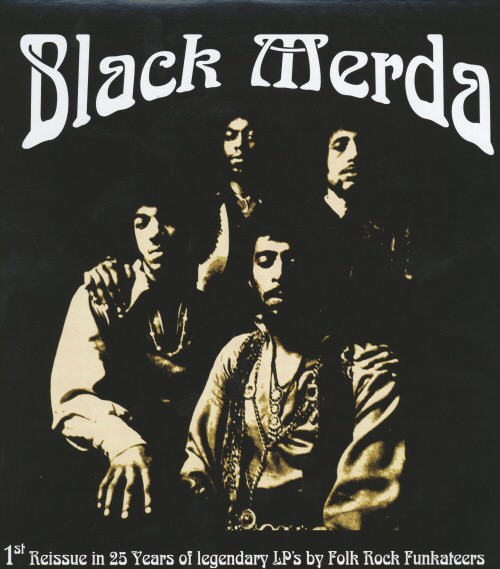 Their
first recordings will held in the company of another colorful character,
Elligton Jordan, aka Fugi. He had already produced a hit for Etta James,
"I'd rather go blind", at a time when he was languishing in Saint Quentin,
doing time for armed robbery. As soon as he got out of the slammer, he
saw a gig with Edwin Starr & the Soul Agents. Quite impressed by their
look and their style (a mix of Hendrix, Muddy Waters and Howlin' Wolf,
according to him), he writes lyrics to one of their tunes which will become
the smoky psychedelic funk hit, "Mary don't take me on no bad trip", released
by Cadet, a subsidiary of Chess, in 1969. In fact they recorded half a
dozen of tracks for an album that never saw the light of day, but that
was finally released in 1996 by Tuff City, under Fugi's name.
Their
first recordings will held in the company of another colorful character,
Elligton Jordan, aka Fugi. He had already produced a hit for Etta James,
"I'd rather go blind", at a time when he was languishing in Saint Quentin,
doing time for armed robbery. As soon as he got out of the slammer, he
saw a gig with Edwin Starr & the Soul Agents. Quite impressed by their
look and their style (a mix of Hendrix, Muddy Waters and Howlin' Wolf,
according to him), he writes lyrics to one of their tunes which will become
the smoky psychedelic funk hit, "Mary don't take me on no bad trip", released
by Cadet, a subsidiary of Chess, in 1969. In fact they recorded half a
dozen of tracks for an album that never saw the light of day, but that
was finally released in 1996 by Tuff City, under Fugi's name.
Fugi, who's moved in with his cohorts, manages
to convince Marshall Chess, son of Leonard, the label's boss, to come to
Detroit to listen to them. As legend has it, he came to their house, had
a look, and signed them on the spot :
« Yep that’s true…though he had heard the track we created for Fugi’s “Mary Don’t Take Me On No Bad Trip”. I think he was impressed by that track, our look, as well as the psyched out crib. He had released “Electric Mud” on Muddy Waters and was trying to revamp his older blues acts to fit in with the new psychedelic music that was popular with young people at that time and we fit right into his plans because we were young, Black, wrote and played our own music, were self-contained and were already playing own original contribution to that style of music… all he had to do was record us. So when he came to see us he looked at the freaked out crib… at the freaked out us…the folded out cover of “Electric Mud” with the picture of Muddy Waters on it hanging on the fireplace and said “I’m convinced” that he wanted to sign us and makes us a “Super Group”. »
Chess releases their first album in 1970. They are confident in their talent and their sound's power. Stark disappointment : the producer that has been attributed to them has decided to highlight their blues side, and his mix has erased the wildest, the most psychedelic passages. Still, "Black Merda" has its moments of hypnotic funk with flamboyant guitars : "Prophet", "Ashamed", "Good Luck" or the huge "Cynthy-Ruth", with its wah wah guitar and tribal "Hoo Hoo"'s, which will be released as a single (in its review of Chains and Black Exhaust, the English magazine Wire went so far as to compare it with "the controversial arrangements by Charles Stepney at the end of the 60s for Muddy Waters or Howlin' Wolf, but with Billy Childish's production style"). The other tracks are somewhere between swampy or atmospheric blues, and folkier ballads (such as the haunting "I Don't Want To Die"), which is why the reissues by Tuff City will come with a "Folk Rock Funkateers" tag. The voices are superb, the atmosphere dark, eerie, somewhat threateningŠ Too late for Hendrix fans, too early for Funkadelic's, some will say. For both of them, it's a must have. One dare not imagine what it was like live.
Embittered, the band make few promotional efforts,
and refuses to tour intensively. In 1971, the mainstream magazine Hit Parader
publishes an article about Black Rock featuring Funkadelic, the Bar-Kays
and Black Merda. At that time, they've decided to see new horizons and
they've gone to California, where Fugi - now playing congas with them on
stage - still has some connections. Tyrone Hite is not along for the trip.
Their old associate has started to turn up late at gigs, resulting in some
tension. He's replaced by a Bob Crowder. The machine is beginning to falter.
In California, their unique sound and colorful
style (frilly shirts, necklaces, paladin hats or keffiehs adorned with
jewels or pearls) has earned them an enthusiastic reception. They share
bills with, among others, War, who are insisting on signing them to their
new label, a seductive offer. Then they get a phone call from Chess, who
are proposing a new album with a bigger budget and another producer. For
mysterious reasons (perhaps to put some distance between them and Fugi,
who's starting to have some serious problems with various addictions),
they get back home and record again in the Chess studios.
This time, their new producer saddles them with
string arrangements. Results are of uneven quality: "For you" looks towards
classical soul, "My Mistake!", a sad murder story, is a lucid and poignant
ballad, and Veasey's voice, at the front of the mix, will give you goose
bumps. As far as the rest is concerned, "Mother's Mixer", "Lying", "Long
Burn The Fire!", "Sometimes I Wish" and "I Got A Woman" are so many funk
manifestoes with a hypnotic grooveŠ Guitars mesh, zigzag, knit infectious
melodies, often in minor chords, carried along by vocals that grab you
and haunting harmoniesŠ An high flying instrumental blues, improvised in
the studio, concludes this second album, less raw but more accomplished.
But the Chicago record label has lost its historic
boss and has just been sold to GRT Corporation, and Marshall Chess has
scooted off to Great Britain to manage the Stones' label. To add to the
confusion, our gang has changed its name to Mer-Da. To make a long story
short, Long Burn the Fire is released in 1972 under the Janus imprint,
without any publicity, and flops out. Without either a recording contract
or a manager, they go back to California, where they rejoin Fugi and Hite
for a while, but the fire has gone out. At the end of 1972, Black Merda
have split.
All will then remain active in music. The original line up even reunites in 1980 under the name "Detroit" (no relation to Mitch Ryder's combo). VC records an album of instrumental "World Fusion" in 2002 (The Greatest by V!), then a live album called "Black Merda the Mighty V Style!" (with a weird cover version of "Foxy Lady" over a drum box background). Meanwhile, a few crazy collectors engineer Black Rock's unexpected come back. Lauded by the Beastie Boys and sampled by Ja Rule, Black Merda returns to the stage in 2005 - minus Hite, who had passed away from cancer in the meantime - for a few dates in Detroit (the Hawkins brothers still live there, and VC lives in the suburbs, in Southfield), in Canada and Cleveland :
« The shows have all been great! Great responses from the audiences! It feels great to play together again…there’s nothing like it. The people attending our shows have been 90% young white males and females 20 to 30 something year olds with a few Blacks and others thrown in for good measure. They really like those early songs…one fan said he wasn’t prepared for the intensity of hearing those songs, live, in person, for the first time. »
To take advantage of the momentum, a new album is being planned. VC even told a US magazine that they had recorded a "Merda-ized" version of the Beatles' notorious "A Day in the Life" !
« Yeah…should be released in Sept. It’s
called “Renaissance” because that’s what Black Merda’s music has been experiencing
in the last few years…a rebirth…a rejuvenation…a renewal of the old, the
original, the classic… but times have changed and we’ve changed…and the
music we write has changed…but it’s still diverse, rocky and funky…there
something there for everyone…we know it’ll probably be overly compared
to our classic stuff… but so be it. »
When you
see what lurks on the guys' turntables, you can look forward to an original
mix of styles...
« We listen to hip hop, jazz, rock, country, classical, a variety of music as we always have…we like all kinds of music… as long as it good and has some spiritual heart and soul in it… but we don’t like all of any kind of music »
...and to less virulent lyrics :
« The situation today is a hell of lot different than back in the day when we penned our lyrics! At least as far as the overt racial problems, the antiwar movement, the civil right movement, the flower power and peace movement goes…though we still have racial problems just not as overt…and we do have a couple of wars in process… but they don’t seem to have nearly the same social significance as the Vietnam war. I have read that in certain European countries the racial situation is now getting pretty much out of hand, similar to how it use to be in the U.S. back in the day. »
Your last word ?
« We’ve read that in French, Italian and
Portuguese “Merda” has some meanings that it doesn’t possess in English…we
want to clear up the misconceptions about that part of our name… although
“Merda” happens to coincide with the French, Italian and Portuguese spellings
of that word…it not the same word… here’s how the our name and our use
of “Merda” originated…Originally our name was “Black Murder” we changed
the spelling of “Murder” to “Merda” as a hipper way of spelling “Murder”…our
spelling of “Merda” is just a different way of spelling “Murder”
and is pronounced “Murder”
So “Black Merda” is pronounced “Black Murder”
make sense? I hope that clears things up for yall. »
Thanks to all our old and new fans for your continued
interest in us and our musical legacy…we feel blessed to have your support!
»
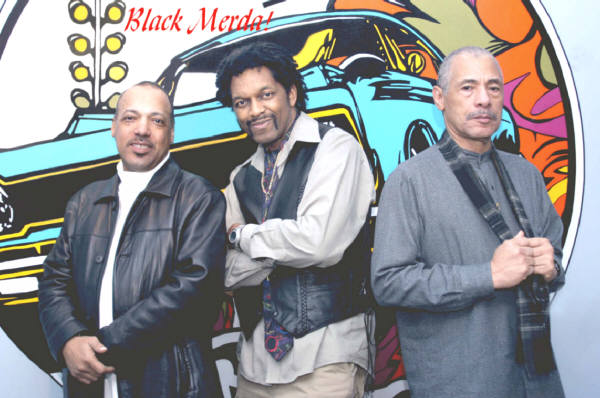
 (Retour à la page articles principale)
(Retour à la page articles principale)